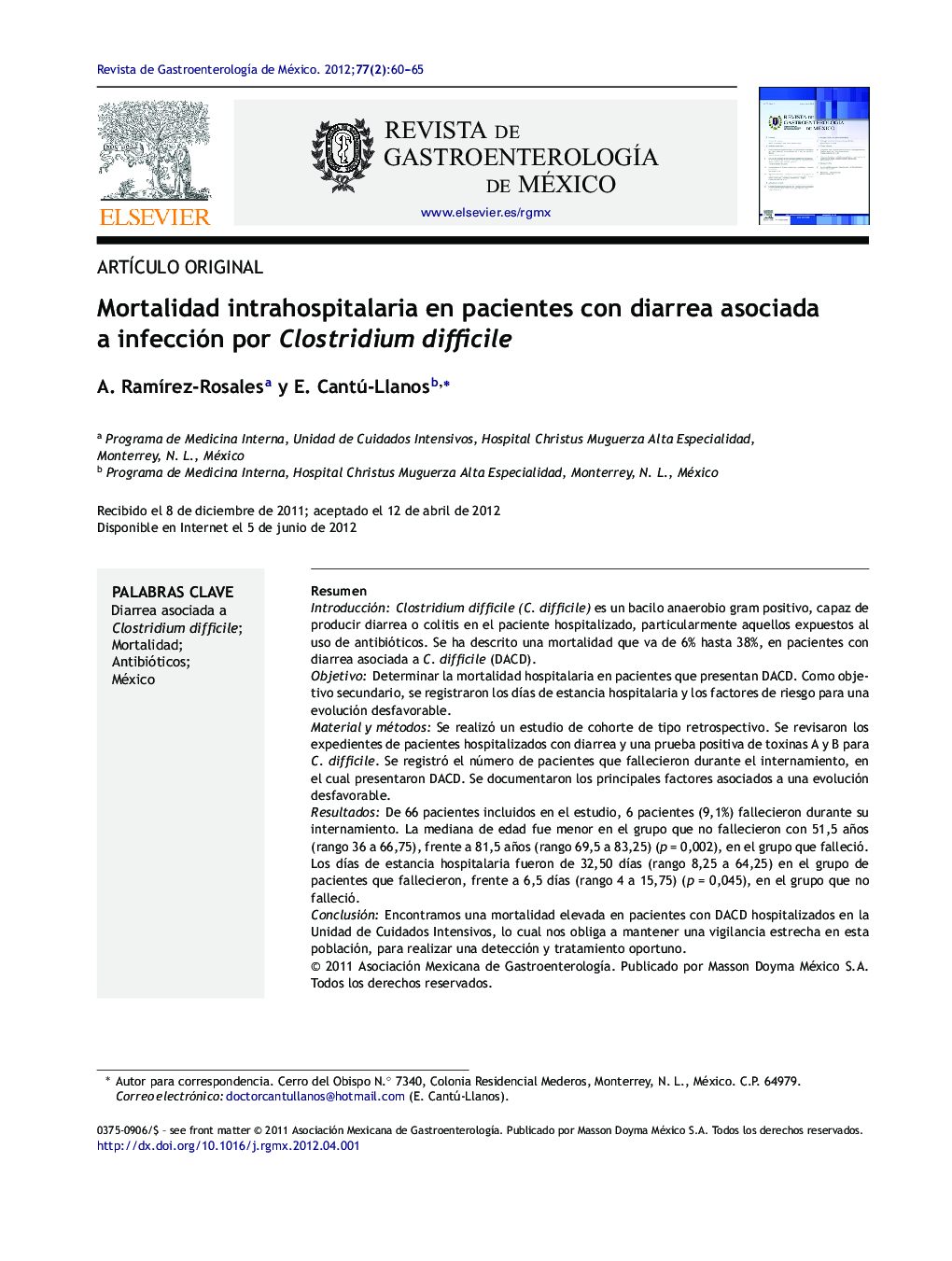| Article ID | Journal | Published Year | Pages | File Type |
|---|---|---|---|---|
| 3318966 | Revista de Gastroenterología de México | 2012 | 6 Pages |
ResumenIntroducciónClostridium difficile (C. difficile) es un bacilo anaerobio gram positivo, capaz de producir diarrea o colitis en el paciente hospitalizado, particularmente aquellos expuestos al uso de antibióticos. Se ha descrito una mortalidad que va de 6% hasta 38%, en pacientes con diarrea asociada a C. difficile (DACD).ObjetivoDeterminar la mortalidad hospitalaria en pacientes que presentan DACD. Como objetivo secundario, se registraron los días de estancia hospitalaria y los factores de riesgo para una evolución desfavorable.Material y métodosSe realizó un estudio de cohorte de tipo retrospectivo. Se revisaron los expedientes de pacientes hospitalizados con diarrea y una prueba positiva de toxinas A y B para C. difficile. Se registró el número de pacientes que fallecieron durante el internamiento, en el cual presentaron DACD. Se documentaron los principales factores asociados a una evolución desfavorable.ResultadosDe 66 pacientes incluidos en el estudio, 6 pacientes (9,1%) fallecieron durante su internamiento. La mediana de edad fue menor en el grupo que no fallecieron con 51,5 años (rango 36 a 66,75), frente a 81,5 años (rango 69,5 a 83,25) (p = 0,002), en el grupo que falleció. Los días de estancia hospitalaria fueron de 32,50 días (rango 8,25 a 64,25) en el grupo de pacientes que fallecieron, frente a 6,5 días (rango 4 a 15,75) (p = 0,045), en el grupo que no falleció.ConclusiónEncontramos una mortalidad elevada en pacientes con DACD hospitalizados en la Unidad de Cuidados Intensivos, lo cual nos obliga a mantener una vigilancia estrecha en esta población, para realizar una detección y tratamiento oportuno.
BackgroundClostridium difficile (C. difficile) is a gram-positive anaerobic bacillus capable of producing diarrhea or colitis in the hospitalized patient, particularly in those exposed to the use of antibiotics, and 6% to 38% mortality in patients with C. difficile-associated diarrhea (CDAD) has been described.AimsTo determine the hospital death rate in patients presenting with CDAD. As a secondary aim, hospital stay and risk factors for unfavorable outcome were recorded.MethodsA retrospective cohort study was carried out. The case records of hospitalized patients presenting with diarrhea and that tested positive for C. difficile through toxin A and B assays were reviewed. The number of non-surviving patients that presented with CDAD during hospitalization was recorded along with the principal factors associated with the worst outcome.ResultsOf the 66 patients enrolled in the study, 6 (9,1%) died during their hospitalization. The median age was lower in the group of surviving patients than in the group of non-surviving patients, with 51,5 years (range 36 to 66,75) and 81,5 years (range 69,5 to 83,25), respectively (p=0,002). Hospital stay was 32,50 days (range 8,25 to 64,25) in the group of non-surviving patients and was 6,5 days (range 4 to 15,75) (p=0,045) in the group with no deaths.ConclusionsThe elevated mortality found in the hospitalized CDAD patients in the Intensive Care Unit makes the maintenance of strict surveillance in this population imperative so there can be opportune detection and treatment.
